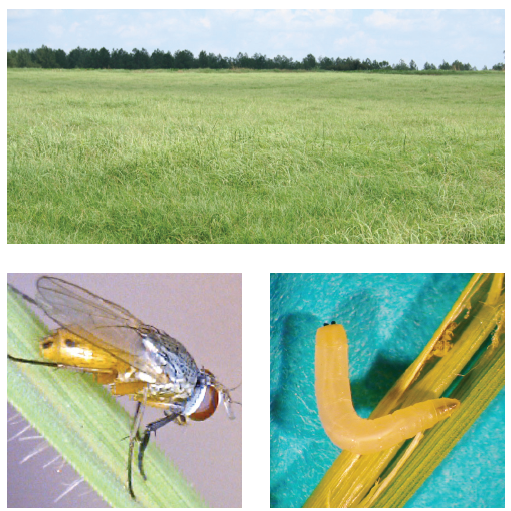Atherigona reversura is the scientific name of the bermudagrass stem maggot, a new invasive fly from south Asia which damages bermudagrass pasture and hay fields. This pest was first discovered in 2009 in California and in 2010 in Georgia, and since these initial sitings in North America, the stem maggot has become a serious pest in bermudagrass grown for grazing, hay and turf. Currently it is spreading throughout much of the Southeast United States with reports in Alabama, Florida, Georgia, and South Carolina.
The damage caused by this new pest in a bermudagrass pasture can be seen when the pasture has a frosted appearance in the middle of summer. Finer-stemmed cultivars are more susceptible to the damage. The fly lays its eggs in the stem of the bermudagrass and the feeding of the larvae causes the death of the upper leaves. The fly has a life cycle that could last approximately 3 to 4 weeks producing many offspring.
Researchers are working to better understand the seriousness of the bermudagrass stem maggot as a pasture pest. They have established a working team to study the basic biology, ecology, and behavior of this insect pest. Detection and monitoring methods such as scouting protocols, adult traps, or other sampling methods (sweep nets, indicator plots), are being developed and will be demonstrated in future educational events.
A monitoring network of county agents and producers in the Florida Panhandle will be set up for early detection and dissemination of early season warnings to producers via websites, newsletters, and social media. This will enable infestations to be detected and suppressed before they reach higher populations that are more difficult to manage. A corollary project of this field effort will be to assess the potential losses caused by various fly population levels to enable a cost-benefit analysis of the use of different suppression tactics.
[important]As a producer of bermudagrass, you can help by completing an online survey about your experience with this invasive pest. Your feedback is important, and this information will help us in the control and management of the bermudagrass stem maggot. Please complete the survey no later than July 31, 2014[/important]
Hay Producer Survey on Bermudagrass Stem Maggot Damage
Project participants from UF/IFAS: Doug Mayo, Shep Eubanks, Mark Mauldin, Liza Garcia, Dr. Russ Mizell, Dr. Nicolas DiLorenzo, and Dr. Cliff Lamb
- Apopka WeevilConfirmed in Jefferson County Nursery - September 14, 2018
- Potential Pests and Diseases of Olives in Florida - October 14, 2016
- Plant Recommendations to Augment Ecosystems Services - February 12, 2016

